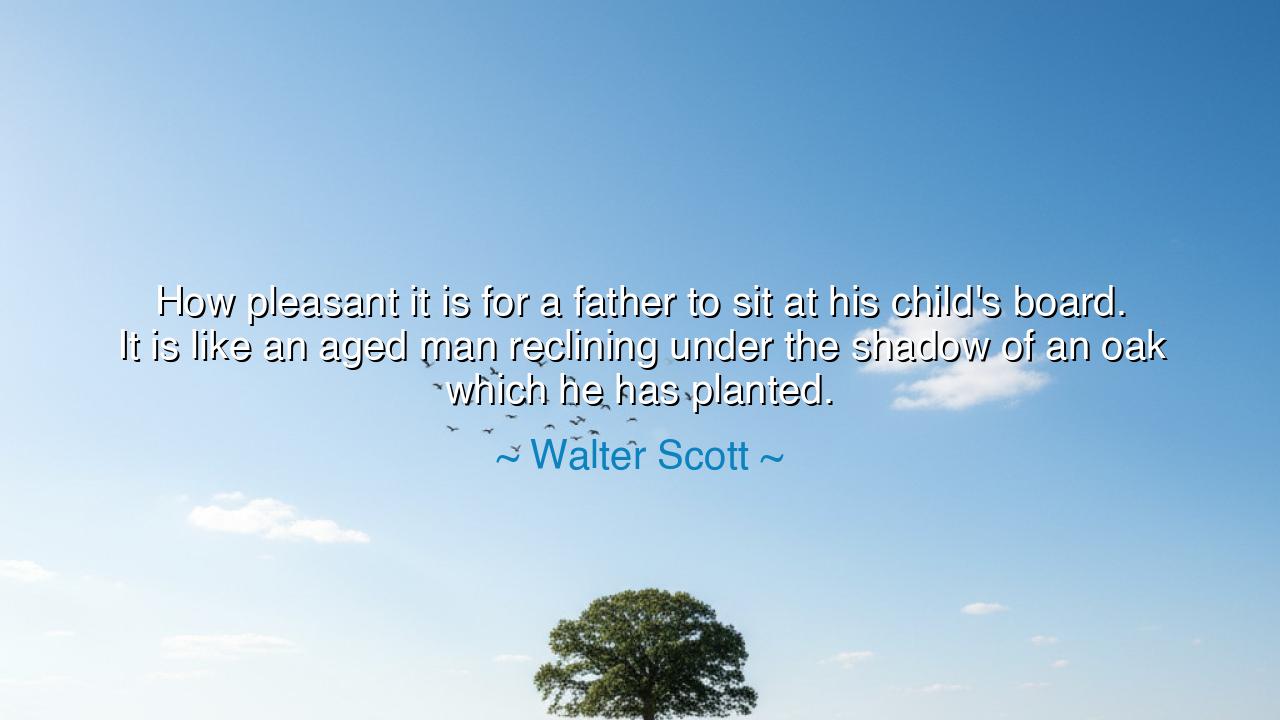
How pleasant it is for a father to sit at his child's board. It
How pleasant it is for a father to sit at his child's board. It is like an aged man reclining under the shadow of an oak which he has planted.






Walter Scott, poet and keeper of ancestral memory, once wrote words that rise with the weight of heritage: “How pleasant it is for a father to sit at his child’s board. It is like an aged man reclining under the shadow of an oak which he has planted.” In this tender image, Scott speaks not only of family, but of the great cycle of life—of sowing and reaping, of planting in youth what one will rest beneath in old age. His words evoke the deep joy of a parent who beholds his child not as dependent, but as one who has grown to provide, to care, and to honor the one who once cared for him.
The meaning here is clear: in fatherhood, there comes a season of labor, of sacrifice, of self-denial for the sake of the young. Yet in time, the child rises, and the roles begin to shift. The father who once fed now receives food, the protector finds himself sheltered, the guide is led. The oak in Scott’s metaphor is the child himself—planted by the father’s devotion, watered by years of care, and finally grown into a tree strong enough to cast shade upon the weary. The joy of the father, then, is not merely in comfort, but in the proof that his labors were not in vain.
History gives us moving examples of this truth. Consider Joseph in Egypt, who, though betrayed by his brothers and cast into slavery, rose to power and became the provider for his father Jacob and all his kin during the famine. How great must Jacob’s heart have swelled, eating at the table of the son he once feared lost! In Joseph, Jacob found both sustenance and the shadow of the oak he had planted. This is the essence of Scott’s wisdom: the fulfillment of parental labor is found when the child, once weak, becomes strong enough to give back.
The metaphor also carries a sense of legacy. An oak does not grow quickly; it requires years, even decades, to reach its fullness. Likewise, the raising of a child is not a work of moments, but of seasons upon seasons. The father who sits at his child’s table in old age does not rejoice only in the meal, but in the knowledge that he has sown patiently and faithfully, and now harvests the fruit of that labor. It is the vindication of time, the proof that sacrifice ripens into blessing when nurtured with love.
Yet Scott’s imagery also humbles us, for not all who plant see their oak grow to maturity. Life’s storms, missteps, or neglect can break the tree before its time. Thus, his words remind us of the sacred responsibility borne by every parent: to plant wisely, to nourish faithfully, and to guard diligently, so that the oak may indeed flourish. The shade of an oak is no accident—it is the fruit of years of unseen labor. So too, the honor of sitting at a child’s board is no chance blessing, but the result of steadfast devotion.
The lesson for generations is this: give yourself fully to the planting while you are strong, for in your later days you will rest in what you have cultivated. Invest in your children not only with bread and shelter, but with love, wisdom, and example. For one day, it may not be you providing for them, but they for you. And when that day comes, your joy will be as Scott describes—deep, quiet, and eternal, like the shade of a mighty oak upon weary shoulders.
Therefore, let Walter Scott’s words be remembered as a song of both hope and duty. The father who plants with love will find rest in love. The parent who sacrifices for their child plants not in vain. And the oak, grown strong, will stand as testimony to the enduring bond between generations, offering shade and comfort long after the hand that planted it has grown frail.






AAdministratorAdministrator
Welcome, honored guests. Please leave a comment, we will respond soon